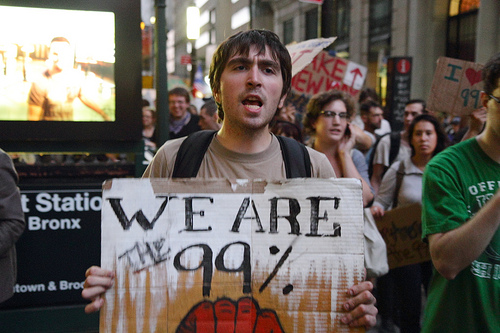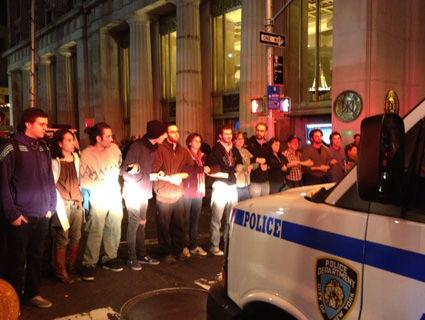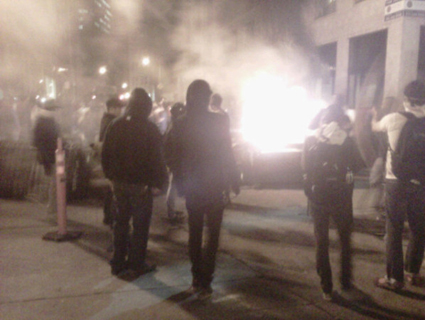By about 4 a.m. today, New York City police had pushed the media out of Zuccotti Park and were preparing to evict the few dozen protesters who remained. Yet there I was, standing in the park amid a gaggle of high-ranking officers, quietly watching the whole thing unfold.
“You gonna occupy awhile?” one officer cracked to another.
“Yeah,” the other guy smiled.
I stood next to them against a short granite wall, trying to avoid notice.
Like the other reporters who’d swarmed to Lower Manhattan to cover the eviction, I’d quickly discovered that the media was not allowed here. The police had created a one-block buffer zone around the park—in some areas two or three blocks—and were refusing to admit even the most credentialed members of the press. A New York Times reporter had already been arrested, a member of the National Lawyers Guild told me. I feared that Occupy Wall Street’s big day was being censored.
As occupiers streamed out of the park, harried by baton-wielding cops, I resolved to get inside. Shielded from view by a car, I slipped under a barricade and came to another blockade across the street from the park’s southeast corner, where I cut through a hole and was quickly approached by a police officer. “I’m not an occupier,” I told him, holding out my business card.
“That’s great, he said, pointing away from the park. “But you are going to have to wait on the other side of the street.”
I waited, and when nobody was looking, I crossed back over as confidently as I could and entered a scrum of suit-wearing police brass and cleanup workers scrubbing the park’s sidewalk. Nobody bothered to stop me as I strode up to the park’s northern entrance and stopped against a wall, a few yards from where police in helmets surrounded the the remaining occupiers.
Next to me, an officer was telling an important-looking guy named Eddie about “the intel we’ve had over the past couple of months” about “the severely mentally retarded, the ones that are real fucked up in the head, and have been violent in the past.” He went on: “They are a little off kilter. They’re off their meds. They haven’t had meds in 30 days.”
“I’m only 24 hours off mine,” Eddie joked.
“It’s good for you, Eddie,” the cop said. “You’ve got to come clean every once in a while.”
As the two men talked, a sweaty-faced man wearing a neon vest over a business suit walked up and started tearing protest signs off the wall.”I couldn’t wait,” he said. “Destroying things never felt so good.”
“Really,” someone said, almost inflecting the word as a question.
“They’re fucking assholes,” the guy in the suit shot back.
Another guy came up to Eddie. “How are we about hooking up the fire hydrants?” he asked. “We talkin’ to somebody?”
“Do it. Do it,” Eddie said over the roar of a garbage truck.
A few yards away, the last occupiers took turns waving a large American flag. Huddled inside the park’s makeshift kitchen, they seemed as diverse as Occupy Wall Street: There was a shaggy punk in a spiky leather jacket. A young girl in a red sweatshirt that read “Unity.” Clean-shaven guys wearing glasses. A shirtless occupier named Ted Hall, who has led an effort to hone the movement’s “visions and goals.” All of them surrounded a smaller group of occupiers who’d chained their necks to a pole.
A white-shirted officer moved in with a bullhorn. “If you don’t leave the park you are subject to arrest. Now is your opportunity to leave the park.”
Nobody budged. As a lone drum pounded, I climbed up on the wall to get a better view.
“Can I help you?” an burly officer asked me, his helpfulness belied by his scowl.
“I’m a reporter,” I told him.
“This is a frozen zone, all right?” he said, using a term I’d never heard before. “Just like them, you have to leave the area. If you do not, you will be subject to arrest.”
By then, riot police were moving in, indiscriminately dousing the peaceful protesters with what looked like pepper spray or some sort of gas. As people yelled and screamed and cried, I tried to stay calm.
“I promise to leave once the arrests are done,” I replied.
“No, you are going to leave now.”
He grabbed my arm and began dragging me off. My shoes skidded across the park’s slimy granite floor. All around me, zip-cuffed occupiers writhed on the ground beneath a fog of chemicals.
“I just want to witness what is going on here,” I yelped.
“You can witness it with the rest of the press,” he said. Which, of course, meant not witnessing it.
“Why are you excluding the press from observing this?” I asked.
“Because this is a frozen zone. It’s a police action going on. You could be injured.”
His meaning was clear. I let myself be hustled across the street to the press pen.
“What’s your name?”
His reply came as fast as he could turn away: “Watch your back.”













